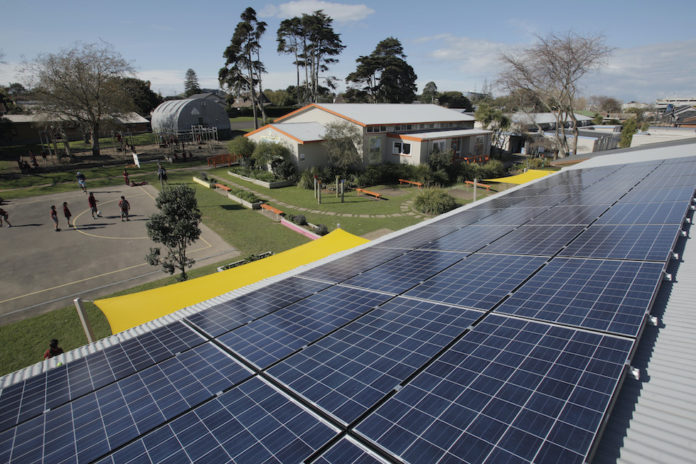
NZ Green Investment Finance (NZGIF) is continuing its investment in solar by providing an $8 million senior debt facility to finance solar panels on schools across New Zealand, alongside energy services provider solarZero.
The new energy initiative, called solarZero Schools, will enable Kiwi schools to convert sunshine into solar energy to power their school, and contribute to an increase in New Zealand’s renewable electricity generation capacity.
solarZero Schools provides solar energy services to schools for no upfront cost and with long-term fixed costs at a price below the current cost of retail electricity, making it an attractive option for schools.
NZGIF has established an $8 million finance facility to fund the operation of solar panels on schools across New Zealand.
It has done this by setting up a facility to provide financing for the installation of solar arrays (including operating costs) using power purchase agreements (PPAs).
NZGIF is also holding $10 million in reserve for future extensions to the finance facility as demand grows.
solarZero estimates the potential generation capacity of the sector to be up to 200MW of solar over time. This is equivalent to more than all of New Zealand’s currently installed photovoltaic solar power generation.
NZGIF is pleased to be supporting solarZero, who are showing real leadership in the market, according to chief executive Craig Weise.
“By financing solar panels on schools, we are helping demonstrate in a tangible way to future generations what a low carbon world can look like,” Weiss says.
“NZGIF’s finance will enable solarZero to deploy distributed solar across schools. This investment will accelerate the uptake of distributed renewable energy projects, and contribute to the decarbonisation of the education sector.”
A key feature of NZGIF’s facility is its ability to scale to meet demand across the education sector. The same facility also has the potential to finance solar PPAs with similar public sector counterparties without the need for duplicated costs.
solarZero chief executive Andrew Booth says tens of thousands of school students from across Aotearoa have called for action to meet the climate emergency head-on.
“Now, for the first time, there is no financial barrier to stop schools from going solar to lead the way for our communities’ transition to 100% renewable energy,” Booth says.
Distributed solar will play a key role in achieving New Zealand’s emissions reduction targets because it is a flexible energy solution that can be deployed relatively quickly.
Independent reports by Transpower and the Energy Efficiency and Conservation Authority (EECA) both forecast the growing role distributed solar will play in New Zealand’s future energy portfolio.
Distributed solar is expected to reduce the total grid investment required to achieve New Zealand’s renewable energy targets and support decarbonisation.
Schools will also have the option to register their interest in installing a battery, which will improve the resilience of schools and communities in the event of a natural disaster.
solarZero is taking registrations for the Schools programme now, and initial interest is high. School principals interested in the joining the programme can register their school at www.solarcity.co.nz/schools.



